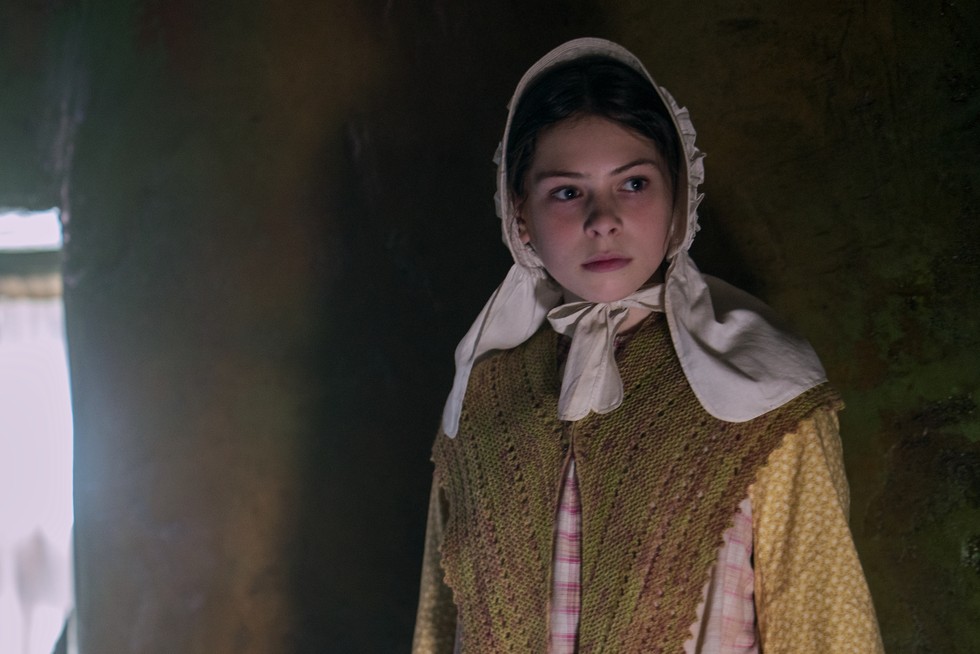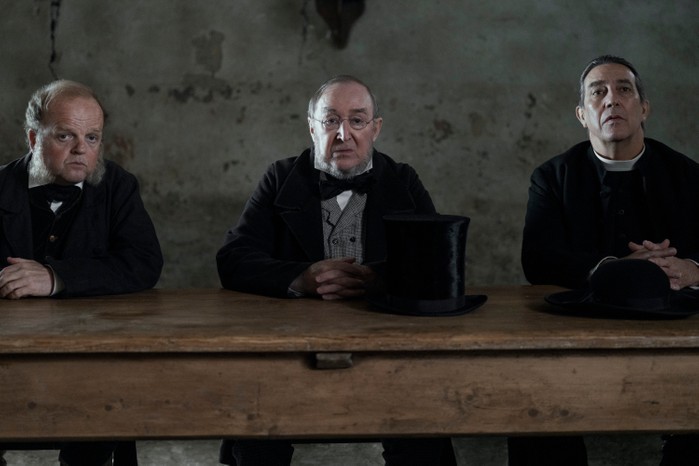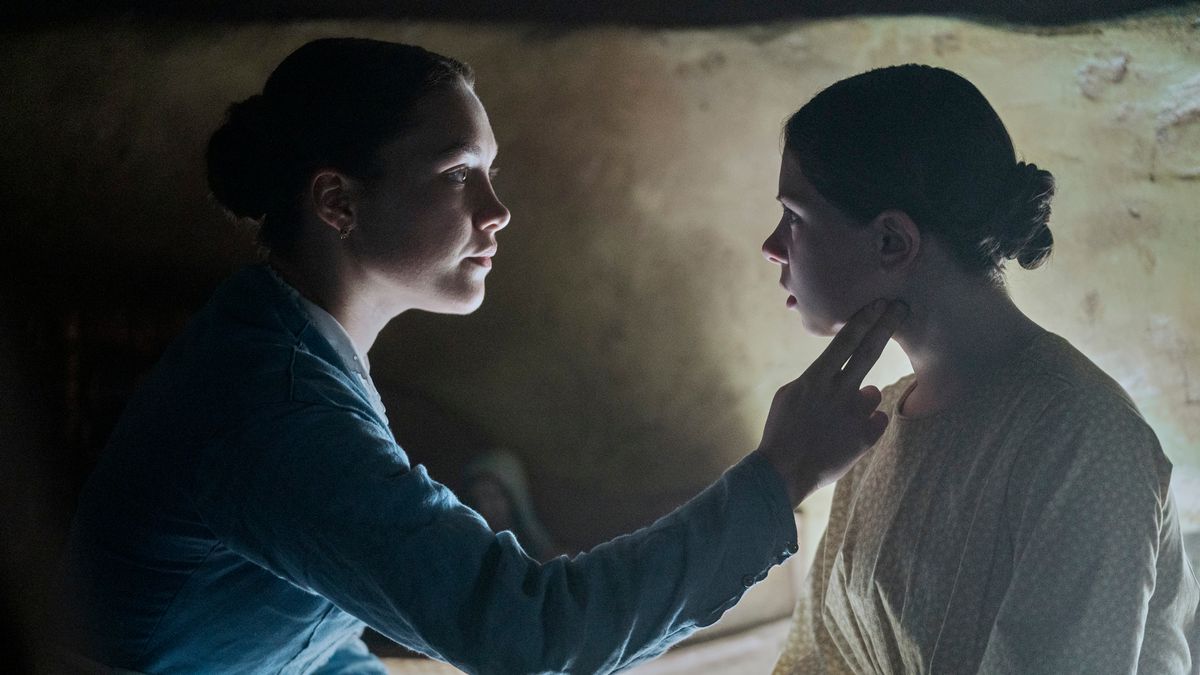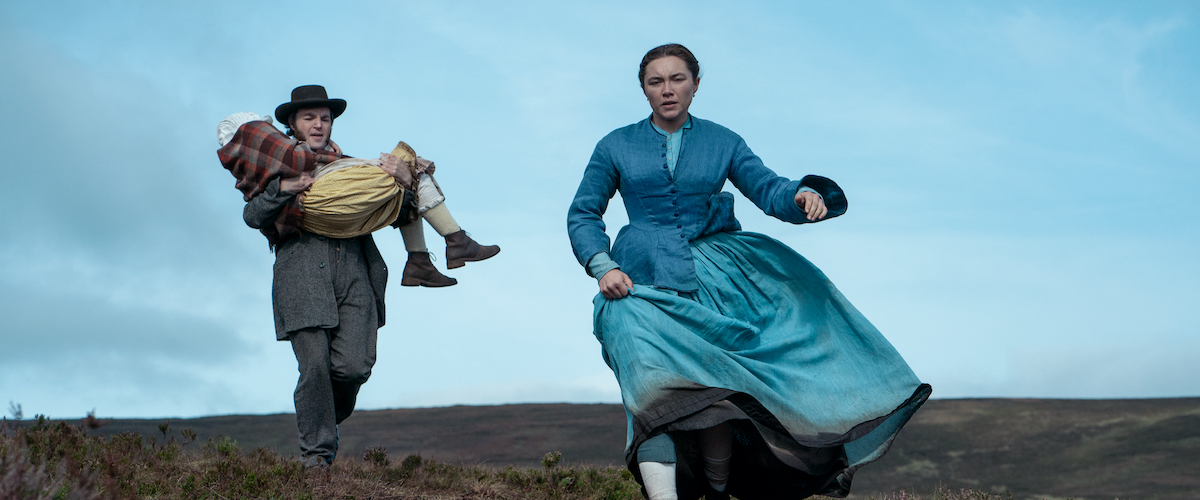The title The Wonder, in case you’re wondering, does not refer to an abstract state of awe experienced by one or more characters in Sebastian Lelio’s new film, the kind of thing Terrence Malick pontificated about in his film To the Wonder. It refers to a devout teenage girl in 19th century Ireland who has, allegedly, not eaten in four months – kept alive possibly only by God’s will.

It could also refer to the film’s star, Florence Pugh, who does not play that girl, but rather, a nurse tasked with keeping watch over her – both to potentially save her if she starts to die, but also to uncover the truth of what’s really going on here, if it’s anything other than what the family says it is. Pugh herself is a bit of a wonder – so interesting in everything she does, and so different from role to role, that she has rapidly ascended the ranks of twentysomething actresses working today.
The Wonder is not a horror film, but it fits in nicely with prestige period horrors that have made an impression in the past decade, particularly the works of Robert Eggers (The Witch and The Lighthouse). The low-hanging mist combines with the regional accents to place us right in the realm to accept that the supernatural might live among us, making the impossible possible.
Lelio is interested in the very art of storytelling more than just this individual story. Anyone who has seen stills from The Wonder may be surprised to see the film open on a modern-day sound stage, costume and set designers moving back and forth between the various sets that will serve as the bedroom for young Anna O’Donnell (Kila Lord Cassidy) and the room at the inn where English nurse Elizabeth Wright (Pugh) is staying. Narration then ponders the need for stories in our lives, in turn breaking the illusion of what we’re about to watch before we even start watching it.
Nurse Wright has been called to a rural village in 1862 Ireland having served with distinction in the Crimean War. Over a period of two weeks, she’s to split a schedule with a local nun, observing an apparently miraculous teenager around the clock to determine whether, indeed, any food has been passing her lips. Local physician Dr. McBrearty (Toby Jones) is so enthralled by young Anna that he has already started hypothesising scientific breakthroughs that could explain what is happening, such as Anna learning to sustain herself on the energy of the sun. Her mother Rosaleen (Elaine Cassidy, the actress’ real mother) and father Malachy (Caolan Byrne) have not been feeding Anna at her own request, and have allowed numerous visitors to come and witness this miracle.
Contributing to the group of sceptics is an English newspaper reporter, William Byrne (Tom Burke), who wants to write a story about the girl, and is believer enough in science to feel certain there’s some fakery going on here. Elizabeth resents his poisonous and self-interested attentions, preventing him access to the girl, but eventually starts to understand that William has the girl’s welfare in mind in addition to his own readership. If she’s really not eating and if she’s being watched around the clock, she either really is a miracle, or she’ll die within a fortnight.
Probably because it isn’t horror as such, The Wonder doesn’t use horror tropes to further disquiet us on the subject of Anna and what may be happening to her. It does have an eerie score by Matthew Herbert, though, and uses the physical symptoms of malnourishment to externalise what’s going on with her internally. As Anna whispers prayers at her bedside and steadfastly refuses everything but water, we find ourselves discomfited not so much by what might be going on supernaturally, but by what’s going on naturally. Here’s a person so much in the grip of religious reverie that she believes she has been chosen by God to survive without corporeal nutrients. That’s scary because there are people in our world who truly believe in something like this, without pulling a scam in the slightest, and might use their certainty to harm others.
Elizabeth forges a maternalistic bond with this girl when her own mother won’t take the necessary measures to save her daughter’s life. They each develop a nickname for the other, and it’s clear Elizabeth – nicknamed “Lib” by “Nan” – is channelling her sorrow over the loss of her own child into Nan. It’s a sorrow she dulls every night with a spoonful of laudanum, a drug with a powerful enough effect on her to give birth to its own moments of supernatural adjacency.
The other dynamic explored interestingly here is the village itself, composed of believers and doubters and elders who may have their own agenda entirely. Science and religion collide throughout, perhaps nowhere more obviously than when Lib and the nun briefly cross paths at the end of one shift and the beginning of the other. Lib really wants to pick the nun’s brain to figure out what she’s thinking, but at the slightest attempt, the nun reminds her “We’re not to confer.” The idea being that they need to produce two independent analyses of what’s happening with this girl at the end of the two weeks, neither biased by the observations of the other.
Since we are already know Lelio views this specifically as a story and that stories are designed as a way for us to examine ourselves, The Wonder is easy to read as a metaphor for the COVID-19 pandemic. This has been the great recent showcase for the hands-on scientific approach to treating a patient (get this girl a vaccine!) and the hands-off religious approach (what God dictates will be, will be). The Wonder doesn’t ram any such binaries down your throat, and is easy enough to appreciate on the level of life’s traumas and the reactions of the body and mind to them.
The Wonder is currently streaming on Netflix and still playing in some cinemas.


